DECLARATION of the Fifth Summit of Conference on Interaction and Confidence Building Measures in Asia. Shared Vision for a Secure and More Prosperous CICA Region
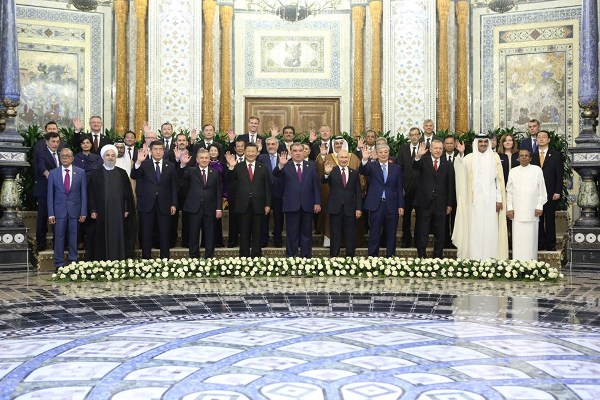
DUSHANBE, 18.06.2019. (NIAT Khovar) – We, the Heads of State and Government of the Member States of the Conference on Interaction and Confidence Building Measures in Asia (CICA),
Having met in Dushanbe, Republic of Tajikistan, on the invitation of the President of the Republic of Tajikistan H.E. Mr. Emomali Rahmon on 15 June 2019 for the Fifth CICA Summit to address the existing, new and emerging issues of collective concern to the Member States, with a view to generating the necessary responses and initiatives thereof;
Highly appreciating the personal role of the First President of the Republic of Kazakhstan, Leader of the Nation Nursultan Nazarbayev, as the Founder of CICA, and expressing our deep appreciation for his significant contribution to the development of CICA and welcoming further active participation of H.E. Mr. Nursultan Nazarbayev in the elaboration of CICA prospects and common efforts for peace, security, and interaction in Asia;
Reaffirming our commitment to the Charter of the United Nations and universally recognized norms and principles of international law, upholding the objectives and principles of CICA enshrined in the Declaration on the Principles Guiding Relations among CICA Member States of 14 September 1999 and the Almaty Act of 4 June 2002;
Emphasizing the importance of common, comprehensive, cooperative, sustainable, indivisible and equal security based on the common understanding that has been reached so far and recognizing the need for developing dialogue on a regional security architecture that is open, transparent, inclusive, evolutionary and based on universally recognized principles of international
law, that creates environment, where all States co-exist peacefully and their peoples live in conditions of peace, freedom and prosperity;
Mindful of the existence of mutual interests and common problems among the Member States and convinced of the need to further strengthen the existing cooperation;
Conscious of the fact that the world community continues to face numerous traditional and non-traditional challenges and threats;
Maintaining that the Member States should uphold solidarity and make further efforts towards enhanced peace and stability in Asia and the world, taking into account richness in the cultural diversity, on the basis of dialogue and cooperation under CICA framework and shared responsibilities in regional and international affairs;
Recognizing that international cooperation is the most important and efficient instrument in addressing the issues faced by the global community;
Underscoring the need to strengthen cooperation between regional and international organizations and fora in Asia and beyond by encouraging establishment and promotion of cooperation ties between CICA and other regional and international organizations and fora on issues of mutual interest;
Deciding to further strengthen the CICA process and continue implementing confidence building measures; and build a harmonious region with enduring peace and prosperity through comprehensive and in-depth dialogue and cooperation;
DECLARE THE FOLLOWING:
1. We recognize that Asia and the world are undergoing complex and profound changes. We reaffirm our commitment to the Charter of the United Nations and universally recognized norms and principles of international law and recall the objectives and principles enshrined in the 1999 Declaration on the Principles Guiding Relations among CICA Member States and the 2002 Almaty Act, and reemphasize that cooperation in the CICA region will be based on respect for the principles of sovereign equality, territorial integrity, political independence, non – interference in internal affairs, peaceful co-existence, mutual benefit and refraining from the threat or use of force against territorial integrity or political independence of any state , or in any other manner inconsistent with principles and purposes of the Charter of the United Nations.
2. We reaffirm our commitment to effective multilateralism with the United Nations at its centre as the universal multilateral organization entrusted with the purposes to maintain international peace and security, develop friendly relations among nations, strive for sustainable development and achieve international cooperation in solving international problems related to economic, social, cultural, humanitarian issues and protect and promote human rights. We support the ongoing reform process of the UN system aimed at improving its ability to address full range of challenges of our time.
3. We fully support the principle of non-interference in the internal or external affairs of States. We confirm that no state or group of states has the right to intervene, directly or indirectly, for any reason whatsoever, in the internal or external affairs of any other state, including with the aim of changing legitimate governments and that every state has the right to determine its political system.
4. We reaffirm that in increasingly interconnected and interdependent globalized world, security has become an all-encompassing concept and the states in the region are sharing common interests in building a sustainable environment conducive to peace and security. We should seek common, comprehensive, cooperative and sustainable security and pursue development and progress based on common understanding that has been reached so far, and to build security environment and forge a constructive partnership that fulfills the expectation of the Member States based on commitment to mutual trust, good neighbourliness and cooperation among the Member States.
5. In accordance with the Charter of the United Nations and international law, we reaffirm the importance of our shared commitment to maintaining and promoting peace and stability, pursuing peaceful settlement of disputes without resorting to the threat or use of force, as well as ensuring safety, security and freedom of navigation and aviation.
6. CICA, being an important multilateral cooperation mechanism in the region, should strengthen multilateral dialogue and cooperation and play a bigger role in promoting equal and indivisible security and common development based on the mutual understanding that has been reached so far in Asia. We will continue to promote representative, fair and sustainable multilateral model of international relations, deepen confidence building measures, consultations, joint efforts and shared benefits and develop dialogue on a regional security architecture that is open, inclusive and based on universally recognized principles of international law and the Charter of the United Nations. We also promote to build international relationship based on mutual respect, fairness and justice, mutually beneficial cooperation, as well as building a community of shared future for mankind.
7. We express our deep concern that conflicts continue to endanger peace, security and development. We reaffirm our position reflected in previous CICA outcome documents on the need for earliest resolution of conflicts on the basis of the Charter of the United Nations, and norms and principles of international law and decisions and documents adopted in this framework.
8. We express our deep concern on the security threat posed by extremism and terrorism in all forms and manifestations and unreservedly condemn of terrorist attacks worldwide, including recent attacks in the Democratic Republic of Sri Lanka and other CICA countries. We express our condolences and sympathies to the families of the victims. We stress that all acts of terror are unjustifiable whenever, wherever and by whomsoever committed. We reiterate our strong commitment to combat terrorism and extremism and call upon states to devise a comprehensive strategy to combat terrorism, including through eliminating conditions conducive to the spread of terrorism, preventing provision of funds, blocking recruitment and cross border movement of terrorists, countering extremism and radicalization, and the spread of terrorist ideology, countering misuse of the Internet for terrorist purposes and dismantling terrorist shelters, good governance, economic development and peaceful resolution of prolonged unresolved conflicts. We recognize the leading role of States and their competent agencies in preventing and countering terrorism and extremism on both national and international levels. We call on all States to unite their efforts against terrorist threats on the basis of international law and the Charter of the United Nations.
9. We take note of the Code of Conduct towards Achieving a World Free of Terrorism at the margins of the General Debate of the 73rd session of the United Nations General Assembly held on 28 September 2018.
We condemn any forms of propaganda of the ideology of terrorism and extremism, separatism and religious intolerance, as well as discrimination based on religion and belief. We welcome the adoption of the resolution of the 73rd session of the United Nations General Assembly “Enlightenment and Religious Tolerance”.
10. We emphasize that peace and reconciliation process in Afghanistan should be inclusive Afghan-led, Afghan-owned. We recognized that terrorism, extremism and illicit drugs pose a great threat to the security and stability of Afghanistan, region and beyond. We call for all Member States to jointly combat terrorism, extremism, and illicit drug production in Afghanistan that provides financial basis for local and international terrorists. It is necessary that the international community assists Afghanistan in combating drug production and trafficking and promoting alternative livelihood; and take necessary measures in countering illicit drugs, precursors, consumption and demand worldwide.
11. In this regard, we take note of the International High Level Conference on Afghanistan “Peace Process, Security Cooperation and Regional Connectivity”, held in Tashkent, the Republic of Uzbekistan on 27 March 2018 and praise the results of the High – Level International Conference on Countering Terrorism and Extremism held in Dushanbe, the Republic of Tajikistan, on 3 – 4 May 2018, which became important platforms for multilateral cooperation in these areas. We also attach positive value to the initiative of the Tajik Government to organize High Level Conference on International and Regional cooperation in countering terrorism and its financing, through illicit drug trafficking and organized crime, held in Dushanbe on 16-17 May 2019 to consider the outcomes of the above Conference.
12. We reaffirm obligations of all States to abide by the Charter of the United Nations and the universally recognized norms and principles of international law in implementing the United Nations Security Council resolutions. We consider that any politicization of the United Nations Security Council sanctions architecture undermines the United Nations Security Council sanctions regime and principles and purposes of the Charter of the United Nations. We reject any unlawful political and economic pressure against any Member State in this regard, particularly with those Member States, whose nations are suffering from negative consequences of unilateral coercive measures at political, cultural and economic levels, taking into consideration the Charter of the United Nations and the universally recognized norms and principles of international law. With regard to Member States we reiterate the principles of international law, including inadmissibility of extraterritorial application of national law inconsistent with the principles of international law.
13. We reaffirm the central role of the United Nations in the global fight against terrorism and extremism. We stay committed to the principles enshrined in the 2002 CICA Declaration on Eliminating Terrorism and Promoting Dialogue among Civilizations and highlight the importance of continued work for elaboration of CICA Action Plan to implement the United Nations Global Counter – Terrorism Strategy.
14. We emphasize that separatism is a threat to state sovereignty, unity, territorial integrity, security and stability. We will not support any separatist movements and entities on the territory of another Member State. We also reiterate our resolve that our territories will not be used by any separatist movements and entities and we will not establish any kind of relations or communications with separatists.
15. Cognizant of the growing threat that transnational organized crime poses to the security and prosperity in the region and also of the linkage in some cases between international terrorism, transnational organized crime and extremism, we confirm the necessity and express readiness to strengthen cooperation in accordance with international and respective national laws in countering transnational organized crime such as drug trafficking, financial crimes, including money-laundering, human trafficking, trafficking in cultural property, illicit arms flows in all their forms and aspects and corruption. Concerned about seriousness of problems and threats posed by corruption to the stability and security of societies, undermining the institutions and values of democracy, ethical values and justice and jeopardizing sustainable development and the rule of law, we encourage the Member States to promote and strengthen measures to combat and prevent all forms of corruption more efficiently and effectively, including by increasing transparency, integrity, accountability and efficiency of public and private sectors, to facilitate and support international cooperation in this regard.
16. We are concerned that a significant number of people are forced to leave their places of habitual residence, which causes significant political, economic, social, developmental, humanitarian and human rights challenges, including for host countries and communities, and recognize the need for greater international cooperation and assistance, in this regard.
17. The situation in the Middle East continues to cause concern and we call on all interested parties to implement related UN resolutions to achieve a peace, security and stability in this region. We also consider it essential to revive negotiations on the Middle East Peace Process, in order to achieve the two-state solution, based on international law, relevant UN resolutions and the Arab Peace Initiative on two sovereign states living next to each other in peace, harmony, tranquility and security. We stay committed to the right of Palestinians to have an independent, and fully sovereign Palestinian state on the border lines of 4 June 1967, with East Jerusalem as its capital, and we strongly support the Historic Hashemite Custodianship of the Holy sites in the Holy City of Jerusalem. We stand firm against any unilateral decision that might lead to changing the status quo of the holy city of Jerusalem. We remain fully concerned about the current financial situation of The United Nations Relief and Works Agency for Palestine Refugee (UNRWA), and emphasize its important role in offering basic and emergency services to the Palestinian Refugees. We call upon all countries to increase their financial contributions, and to seek new ways and means to engage in substantial cooperation with UNRWA in accordance with its UN mandate.
18. We reiterate our unwavering support to Joint Comprehensive Plan of Action (JCPOA), which remains a significant achievement of multilateral diplomacy endorsed unanimously by the United Nations Security Council through resolution 2231 dated 2015 and underscore that JCPOA proved to be effective and has no better alternative at present and welcome the full implementation of its nuclear-related commitments by the Islamic Republic of Iran, as repeatedly confirmed by the International Atomic Energy Agency (IAEA), and call upon all other parties to fulfill in total their own obligations stemming from JCPOA and the United Nations Security Council resolution 2231 so that overarching goals which induced the conclusion of the accord are achieved in due course and in a timely fashion.
19. Taking into account para13 of the Almaty Act, we consider that the earliest ratification of the Protocol to the Treaty on a Nuclear-Weapon-Free Zone in Central Asia by all States, who signed the Protocol, will make a significant contribution to regional security and strengthening the global non-proliferation regime. We support the establishment of a Middle East Zone Free of Nuclear Weapons and other Weapons of Mass Destruction, based on arrangements freely arrived at among the states of the region concerned. We also support Mongolia’s nuclear-weapon-free-status.
20. We are convinced that working together in the area of non-proliferation, disarmament and arms control, and cooperating with all our partners, we will significantly contribute to a safer and more secure world. We call upon all states to fulfil their respective obligations in the sphere of disarmament and non-proliferation. Member States that are State Parties to the Treaty on the Non-Proliferation of Nuclear Weapons (NPT) reiterate their commitment to safeguarding and strengthening the universality, effectiveness and authority of NPT, and promoting the three pillars of NPT in a comprehensive and balanced manner to make the 2020 NPT Review Conference a success.
21. We support the inalienable right of all Member States to develop and use nuclear energy for peaceful purposes, including national fuel cycle for power generation, with due respect to their non-proliferation obligations and their commitments emanating from agreements to which they are parties, in particular the IAEA Safeguards Agreements.
22. We note the concern about the prospect of weaponization and an arms race in outer space. We recognize that negotiations for the conclusion of an international agreement or agreements to prevent an arms race in outer space remain an important agenda of the Conference on Disarmament. We note the introduction, by the People’s Republic of China and the Russian Federation at the Conference on Disarmament, of the draft Treaty on the Prevention of the placement of weapons in outer space and of the threat or use of force against outer space objects in 2008 and the submission of its updated version in 2014. We reiterate that the Conference on Disarmament, as the single multilateral disarmament negotiating forum, has the primary role in the negotiation of a multilateral agreement or agreements, as appropriate, on the prevention of an arms race in outer space in all its aspects. We welcome the deliberations held in 2018-2019 in the United Nations Group of Governmental Experts on further practical measures for the prevention of an arms race in outer space tasked with considering and making recommendations on substantial elements of an international legally binding instrument on the prevention of the arms race in outer space.
23. We reaffirm that proliferation of chemical and biological weapons and their means of delivery pose a threat to international peace and security, and call upon all Member States to fulfill their respective obligations in the sphere of disarmament and non-proliferation. In this regard, it is vital to prevent terrorist and criminal groups from attempts to acquire chemical, biological and radiological weapons, their means of delivery and related materials and multilateral efforts to reduce this threat should be greatly encouraged. Member States that are State Parties to the Convention on the Prohibition of the Development, Production and Stockpiling of Bacteriological (Biological) and Toxin Weapons and on their Destruction (BTWC) reiterate their commitment to strengthen the BTWC. We take note of the initiatives of multilateral negotiations on an international convention for the suppression of acts of chemical and biological terrorism.
24. We believe that promotion of inclusive and sustainable economic growth and prosperity, as well as elimination of poverty and illiteracy, are among the most effective measures to remove the breeding ground of terrorism and extremism. We stress the need to further conduct regional and sub-regional dialogue, strengthen multilateral cooperation and adopt appropriate measures to promote sustainable development, economic cooperation and well-being of our people. We call for greater market access, non-discrimination in trade, increase of domestic and international funding for agriculture, improving market of the agricultural products for direct access of agricultural manufacturers and rural development; promotion of sustainable agricultural production; and work towards enhanced food security for all, especially in Asia.
25. We emphasize that under no circumstances should people be deprived of their own means of subsistence and development and stressed that no illegal restrictive measures should be taken against any Member State in this regard, taking into consideration the Charter of the United Nations and the universally recognized norms and principles of international law with regards to the sovereignty of the Member States and non-interference in the internal affairs of the Member States.
26. We acknowledge that energy security, including supply and demand, has impact on sustainable development at national, regional and global levels and well-being of people in all countries. We commend contributions of the Member States to ensure energy security. We recognise high potentials of various energy resources in the CICA region, including renewable and clean energy sources. Taking into account the interdependence of bilateral and multilateral commitments in relevant areas, we strongly encourage cooperation in development and deployment of low emission technologies and renewable energy technology, sharing expertise and technologies, especially by developed countries to developing countries.
27. We acknowledge the importance of global partnership in mobilizing financial resources and investment with a view to achieving the Sustainable Development Goals.
28. Increased deployment and use of advanced low emission technologies for fossil fuels, renewable energy and increased energy efficiency are crucial in addressing climate change and achieving Sustainable Development Goal 7. Member States are encouraged to participate in different cooperative platforms and mechanisms and undertake concerted efforts to reduce the costs of finance and technology and to mobilize capital for increased deployment of modern energy technologies.
29. We welcome all initiatives of the Member States to promote and strengthen cooperation in various fields, including economy, finance, transport and trade within the geography of CICA at bilateral and multilateral levels in conformity with the purpose and principles enshrined in the Declaration on the Principles Guiding Relations among CICA Member States of 14 September 1999.
30. We confirm readiness for joint cooperation for ensuring availability and sustainable management of water and sanitation for all to achieve the water related Sustainable Development Goals and targets.
31. We, recalling the United Nations General Assembly resolution 71/222 of 21 December 2016, welcome the efforts aimed at the implementation of the International Decade for Action: “Water for Sustainable Development” 2018-2028, which provide a timely platform for dialogue and exchange of information, good practices and expertise, as well as an important instrument to facilitate achieving the water-related sustainable development goals and targets.
32. We emphasize the importance of an open world economy, enabling all countries and peoples to share the benefits of globalization, and remain firmly committed to a rule-based, transparent, non-discriminatory, open and inclusive multilateral trading system, centering around the WTO, taking into consideration its reform process, and firmly oppose to all forms of protectionism.
33. We emphasize that joint efforts for promotion of regional connectivity, especially integrated and competitive transport and logistics systems, will help achieving more efficient use of trade opportunities among the Member States and accelerate regional and international transport and transit cooperation that will duly serve the goal of sustainable economic development.
34. We consider cultural diversity as a precious asset of CICA. We are convinced that the cultural diversity, as well as cultural heritage, is a wealth to be sustained by all as a factor of peace and development among all nations. We stand ready to advance extensive dialogues across cultures, civilizations and faiths; encourage inclusiveness, mutual learning and understanding; draw on each other’s strengths for common progress; and promote regional connectivity, including through people-to-people contacts. We shall respect each other’s right to freely choose and develop political, social, economic and cultural systems. In this regard, we welcome the Kazan Forum on Intercultural Dialogue held in Kazan, the Russian Federation, on 4-7 September 2018, VI Congress of the Leaders of World and Traditional Religions, held in Nur-Sultan (Astana), the Republic of Kazakhstan, on 10-11 October 2018, Annual Surajkund International Crafts Fair in Haryana, India, the Fifth World Forum on Intercultural Dialogue, held in Baku, the Republic of Azerbaijan on 2-3 May 2019 and the Conference on Dialogue of Asian Civilizations, held in Beijing, the People’s Republic of China, on 15-22 May 2019, which are concrete contributions to civilizational dialogue and exchanges in the region.
35. We agree to explore a possibility of establishing appropriate CICA events for parliamentarians, universities, academia, research institutes, business incubators, youth, artists, cultural groups, archival institutes, schools, libraries and media community at platforms such as Non-Governmental Forum, CICA Business Council and CICA Youth Council in order to expand the scope of people-to-people contacts at various levels. In this regard, we welcome the Third Conference of CICA Youth Council, held in Baku, the Republic of Azerbaijan, on 13-14 April 2018.
36. We emphasize the need to promote tourism, including through reviving the centuries old traditions of the Ancient Silk Road which used to connect and facilitate strengthening of relations among peoples. In this regard, we welcome the Third World Nomad Games, held in Cholpon-Ata, the Kyrgyz Republic, on 2-8 September 2018. We welcome convening of CICA Building Bridges across Asia, held in New Delhi, India, on 28-29 September 2017 to promote cooperation in tourism through exchange of information and cooperation among tourism promotion agencies.
37. We emphasize the importance of strengthening cooperation, partnership and external relations between CICA and other regional and international organizations and fora. In this regard we encourage the CICA Secretariat to continue its efforts to forge institutional level relationships with regional and international organizations and fora.
38. We welcome efforts of the coordinating and co-coordinating countries to promote cooperation in different dimensions of Confidence Building Measures. We stand ready to keep with the principles of voluntary and equal participation, consensus building and gradual basis, conduct dialogue and consultation, further strengthen cooperation; work on further strengthening of the CICA process; and support CICA in playing more significant role in Asia. In this regard, we welcome the adoption of the CICA Memorandum of Interaction in the Area of Small and Medium Enterprise.
39. Taking into account the outcomes of the CICA Financial Forum, held in Chengdu, the People’s Republic of China, on 7-8 December 2018, we encourage the Member States to pursue forward looking pragmatic cooperation and activities and financial cooperation in the CICA region, as appropriate.
40. We appreciate the work undertaken by the CICA Secretariat to develop CICA; and support further strengthening of the Secretariat for a better fulfillment of its mandate, entrusted by the Member States. We appeal to all CICA Member States to consider making voluntary contributions to the budget of the Secretariat on a regular basis.
41. We take note of the proposal of the Republic of Kazakhstan to explore the possibility of establishing a fund for research and planning, financing projects, programs and other activities of CICA, collectively agreed upon by the Member States and on voluntary basis.
42. We request those Member States, which have not already done so, to ratify the Statute of the Secretariat of the Conference on Interaction and Confidence Building Measures in Asia on an expeditious basis.
43. We also request those Member States, which have not done so already, to sign and ratify the Convention on the Privileges and Immunities of the Secretariat, its Personnel and Representatives of Member States of the Conference on Interaction and Confidence Building Measures in Asia.
44. We welcome the Democratic Socialist Republic of Sri Lanka as a new member of CICA.
45. We highly commend the work carried out by the previous Chairmanships, Republic of Kazakhstan, the Republic of Turkey and the People’s Republic of China, respectively.
46. Since assumption of CICA Chairmanship by the People’s Republic of China in May 2014, China has played an important role for advancing the CICA process, promoting CICA institution building, adopting and implementing CBMs.
47. We welcome the Republic of Tajikistan’s assumption of the Chairmanship of CICA in 2018 and are confident that Tajikistan, in close cooperation with other Member States and the Observers, will pursue efforts to raise CICA cooperation and development to a higher level. We pledge our support in this regard.
48. We agree to hold the Sixth Meeting of CICA Ministers of Foreign Affairs in 2020 and the Sixth CICA Summit in 2022.
49. We express our gratitude to the Republic of Tajikistan for the hospitality and excellent organization of the Fifth CICA Summit.
Dushanbe, 15 June 2019










 Sheep of the Hissor Breed Are Originally Tajik and Considered the Largest in the World
Sheep of the Hissor Breed Are Originally Tajik and Considered the Largest in the World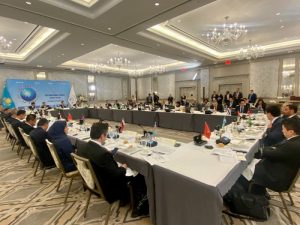 Tajikistan Invites CICA Member States to the Dushanbe Water Conference 2024
Tajikistan Invites CICA Member States to the Dushanbe Water Conference 2024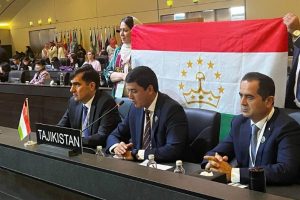 Tugay Forests of the Tigrovaya Balka Nature Reserve Included in the UNESCO World Heritage List
Tugay Forests of the Tigrovaya Balka Nature Reserve Included in the UNESCO World Heritage List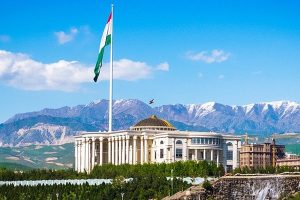 TAJIKISTAN IS TAKING SUSTAINABLE STEPS TO PROVIDE THE RIGHTS AND FREEDOMS OF HUMAN AND CITIZEN. In the light of the adoption of the National Strategy of Tajikistan in the field of human rights protection for the period up to 2038
TAJIKISTAN IS TAKING SUSTAINABLE STEPS TO PROVIDE THE RIGHTS AND FREEDOMS OF HUMAN AND CITIZEN. In the light of the adoption of the National Strategy of Tajikistan in the field of human rights protection for the period up to 2038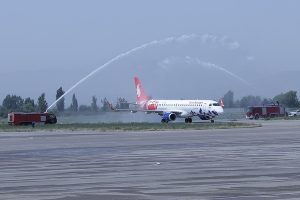 Buta Airways Carries First Baku — Dushanbe Flight
Buta Airways Carries First Baku — Dushanbe Flight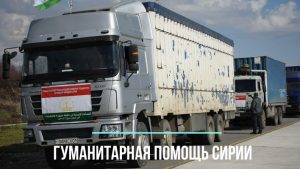 President of Tajikistan Sends Humanitarian Aid to Earthquake Affected People in Syria
President of Tajikistan Sends Humanitarian Aid to Earthquake Affected People in Syria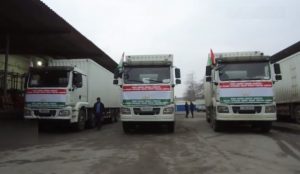 President Sends Aid to Families Affected by the Natural Disaster in the Gorno-Badakhshan Autonomous Region
President Sends Aid to Families Affected by the Natural Disaster in the Gorno-Badakhshan Autonomous Region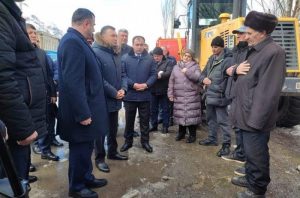 Prime Minister Rasulzoda Visits Khorug
Prime Minister Rasulzoda Visits Khorug IRS: The Consequences of Avalanches Have Been Eliminated on the Dushanbe-Chanak Highway and Traffic Has Been Provided
IRS: The Consequences of Avalanches Have Been Eliminated on the Dushanbe-Chanak Highway and Traffic Has Been Provided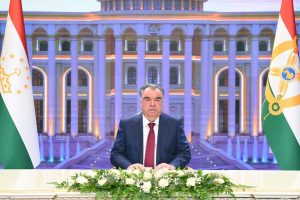 President Emomali Rahmon Calls 2022 Another Historic Year for Tajikistan
President Emomali Rahmon Calls 2022 Another Historic Year for Tajikistan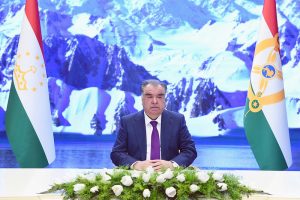 UNGA Supports President Rahmon’s Initiative to Declare 2025 as the International Year of Glacier Protection
UNGA Supports President Rahmon’s Initiative to Declare 2025 as the International Year of Glacier Protection GEOLOGIST’S DAY. How Rich Is Tajikistan and Why Is It Important to Develop Geology in the Modern World?
GEOLOGIST’S DAY. How Rich Is Tajikistan and Why Is It Important to Develop Geology in the Modern World?













